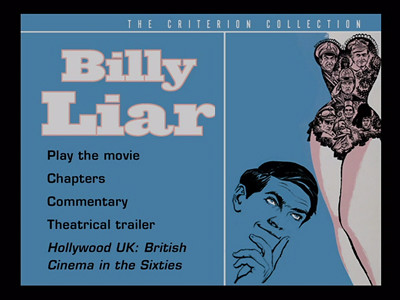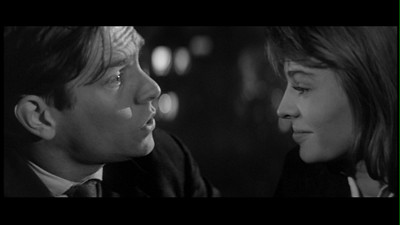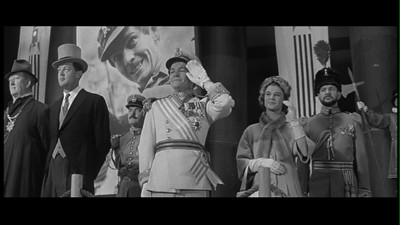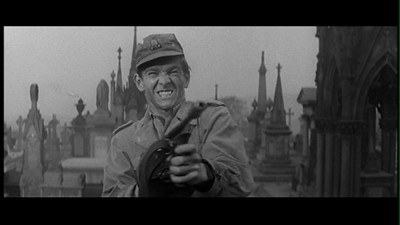
I'm working on a new short comic book story that involves the actress Julie Christie as a topic of discussion. This is a bit of a boon for me, as it gives me an excuse to spend some time reviewing some of my favorites of her films. Given that the script revolves around a brief affair and a missed opportunity at love, Billy Liar is a natural point of reference. In the film, Christie plays Liz, a free spirit who breezes in and out of Billy's life, never settling for too long, always on to something more. For him, she represents escape, and she even opens the hatch for Billy to jump through with her, but he doesn't have the bottle to step across.
Billy Liar was Julie Christie's third film, but the first role to really get her noticed by the public. It's a supporting part, barely more than a cameo, but director John Schlesinger clearly saw the star cresting over the horizon, as he gave her the final spot in the opening credits. "And JULIE CHRISTIE," it proclaims, as is normally done for a big name that doesn't get a place above the title but deserves to be singled out. Though the actress is really only in four scenes of the movie, not counting her background role in Billy's fantasies, she ends up being the thing you remember most about it. Our first introduction to her ends up completely separating us from Billy for the only time in the entire movie, following Liz around town, watching her turn heads wherever she goes--often quite real reactions, as this sequence was shot on the street, verite style. That final shot of her looking out the train window, her expression a mixture of pity, regret, and true caring, is the sort of thing that probably haunts many a man's dreams as the years grow long. In that moment, Julie Christie represents the opportunity missed, the moment we let pass that we should have grabbed. She is the girl Everett Sloane saw on the ferry and remembers fondly in Citizen Kane

Not that I should let Liz completely overshadow poor Billy (played by the marvelous Tom Courtenay), but she does end up being the central point in the screenplay where the character has the chance to finally stop talking and actually do something. His nickname of Liar is well earned. He tells stories about sisters that don't exist, injuries his father never sustained, has two fiancées at the same time, and a host of other mistruths large and small. He's an interesting character, because though he fits in with so many other creative dreamers that we've seen in other movies, he's not always redeemable in his actions. Unlike, say, Max Fischer in Rushmore, who also dreams big and tells plenty of fibs, Billy has never stopped to think about the feelings of others. Where Max's tall tales eventually get him in over his head and he becomes careless, he's never really malicious. Selfish, sure, but not callus.
Billy is indicative of the "angry young men" who populate many of the 1960s British dramas, though he's more fanciful than a bruiser like Richard Harris in This Sporting Life or the caustic Richard Burton of Look Back in Anger

The key to our having sympathy for Billy is in Tom Courtenay's performance. Though the small-minded and obnoxious people around him--his boorish father (Wilfred Pickles), his self-important boss at the funeral home (Leonard Rossiter) with his models of plastic coffins (talk about a metaphor for a foreboding future!), the shrill Rita (Gwendolyn Watts) and the prudish Barbara (Helen Fraser)--are enough to make us understand why maybe Billy would need to retreat into his imagination, it doesn't really excuse his lack of moral consequence. He shouldn't be sympathetic, yet Courtenay manages to make the boy extremely vulnerable, always spreading a thin layer of anxiety under the braggadocio. Billy fears his own lies will collapse on top of him, and he'll be stuck going nowhere forever.
It also helps that his fantasy world, excepting the multiple times Billy guns down family and friends with a pantomime machine gun, is so tame. Novelist Keith Waterhouse, adapting his work to both stage and screen in collaboration with Willis Hall, concocts for Billy a rather quaint kingdom called Ambrosia. The very name conjures up how inoffensive and insubstantial this fantasy world is. Though the classical derivation of the word comes from the Greek and a mythical nectar of the gods, thus being named for an outdated concept in service to long-passed deities, a more modern use is for the name of a sickly sweet kind of fruit salad. Made with sour cream and Miracle Whip, it's a gooey and doesn't really stick to the ribs. It's also something your grandmother would make to take to church potluck, declaring "Everybody loves ambrosia." A kingdom of Ambrosia would thus be strangely comforting, relatively colorful, and of little nutritional value.

Yet, to fall backward into a pile of ambrosia, as Billy does when he disappears into his head, you'd receive a rather soft landing. There is an unspoken loneliness that comes with these daydreams, however, in that there are few other people in them. Liz stands in the background--a foreign secretary of some kind, as Billy tells her, in the one scene where he actually opens up to someone--but she never speaks. Otherwise, Billy casts himself marching in the more important roles, including, most humorously, as a black soldier in a parade. Though we might gasp at the blackface, by having the character break the fourth wall and wink at the audience, it somehow makes it all okay.
Billy's fate at the end of the picture is bittersweet. The boy who cried wolf ends up getting knocked down by the one lie he actually believed. Having thought he was going to get a job writing for a television comedian (Leslie Randall), he quit his post at the mortuary (itself stifling and symbolic of the lack of life around Billy; he also has a love scene in a cemetery) and tells everyone he is moving to London, only to discover he has misunderstood the response to his writing samples. It's on the heels of this failure, though, that Liz offers him his chance. He can go with her and they will be married, getting out of town once and for all. This should be everything that Billy could hope for, especially since, even through his two false engagements, Liz was always the girl he wanted.

So, why then, can he not go through with it? Liz knows it probably even before he does, hence how his suitcase appears on the station platform before he can conveniently miss getting back on the train, having jumped off to buy milk, that most wholesome of drinks. I suggested at the outset that it was cowardice, that Billy didn't have the guts when it counted, but as I wrote this all out, my thoughts became more clear. It's that bit about not having any sense of moral consequence. To run to London, Billy would leave behind troubles at home and the mess he's created for himself at work, as well as the broken hearts of Rita and Barbara, without actually dealing with them. It would be a true escape, a cut and run.
To stay means to accept the responsibility of what he has done, to face it and be a man. This makes way for the final fantasy, of Billy marshaling his troops and marching back to the house he grew up in, prepared for the war of his life. With this decision, Billy Liar may have let Julie Christie go, but he finally embraced himself and what it means to be a man.


1 comment:
Billy did not go WITH LIZ because HE COULD NOT TURN FANTASY INTO REALITY FOR HIMELF WITH A beAUTIFUL GIRL WHO BELIEVED IN HIM AND IT WAS A GOLDEN OPPORTUNITY FOR HIM TO VANISH FROM ANGST HOME AND SUCEED AS HE WANTS TO DO.SAD ENDING. HE SHOULD HAVE GONE WITH LIZ AND HE WOULD Have been much happier, and who knows succeed at something!I THINK HE WOULD HAVE DONE WELL IN THEATRE OR WRITING OR SOMETHING IN THE ARTS.LIZ WOULD HAVE BEEN A FABULOUS WIFE AND PARTNER.TOO BAD.
Post a Comment